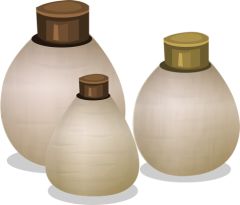Tanning Lotions – What Are Bronzer Lotions?

Tanning salons sells a huge selection of lotions that all promise to take your tan to the next level. They claim to make your tan last longer, encourage a deeper color, and be great for your skin. It all sounds like it could be too good to be true. What are bronzer lotions anyways, and do they really work?
There are two main types of bronzing lotions: ones that contain DHA and natural ones. DHA bronzing lotions are most common, and their effects are longer lasting. Natural bronzing lotions are becoming more popular as consumers are seeking out products with fewer chemicals.
DHA Bronzing Lotions
The main active ingredient in DHA bronzing lotions is called dihydroxyacetone, or DHA. DHA works by darkening the dead skin cells that are on the surface of the skin. The DHA and the amino acids in these cells react and produce melanoidins. These melanoidins give the skin a brown appearance.
Because it doesn’t work with deeper layers within the skin, the results from bronzing lotions typically last up to 10 days. The dead skin cells that react with the DHA are sloughed off as part of the natural skin cycle, and the bronzing lotion will have to be reapplied.
Natural Bronzing Lotions
Natural bronzing lotions do not contain DHAs that react with dead skin cells. In order to achieve a tanned look, natural bronzing lotions contain herbal extracts that naturally encourage the skin to produce melanin. Melanin is what makes skin darker while tanning.
Natural bronzing lotions contain a variety of botanical ingredients that cause the skin to appear tanned. These include ingredients like dark chocolate, coffee, caramel color, cocoa, and fruit extracts. Some bronzing lotions that claim to be natural still contain at least a small amount of DHA because it is the most reliable way that a bronzing lotion can darken the skin.
Pros and Cons
Bronzing lotions that contain DHAs will definitely make the skin darker. It can take anywhere from a few hours to a few days after application for the skin cells to complete the chemical reaction with the lotion. This look will last as long as the dead skin cells exist on the skin. This could be up to ten days, but the color will have begun to fade before then.
DHAs in bronzing lotions are deemed safe by the Food and Drug Administration. They have approved the use of DHAs topically and report few possible side effects.
Natural bronzing lotions that do not contain DHAs are not quite as reliable as DHA bronzing lotions. Natural bronzing lotions that rely on natural enzymes to create a darker color in the skin sometimes do not reach the depth of color that some consumers are looking for. These products generally need to be reapplied more frequently.
How to Apply Bronzing Lotion
Applying bronzing lotions can be tricky to apply because the color does not appear for at least a few hours after application.
1) Bronzing lotions work best on skin that is regularly exfoliated and moisturized. Otherwise, the DHA will react with layers of dead skin that are sloughed off too soon.
2) Bronzing lotion should be applied with patience. Time should be taken to properly massage the product into the skin to ensure total coverage. Missed spots will look unnatural.
3) Remove some bronzing lotion from the joint areas. Knees, ankles, and wrists tend to react more with the bronzing lotions and can become darker than the rest of the skin. Removing some bronzing lotion from these areas can create a more even and natural look.
4) All bronzing lotion should be washed off of palms immediately after application. DHAs in the bronzing lotion will also react with the skin on the palms of the hands.
5) Avoid sweating or getting wet immediately after application. Bronzing lotion needs at least a few hours to work and it shouldn’t be wiped or washed off before the skin has had a chance to reach the desired color.
Bronzing lotions are a safe and effective way to achieve a tanned look without visiting the tanning bed. They work well on their own or in conjunction with a tanning salon schedule. They are especially good for extending the time between tanning appointments.
